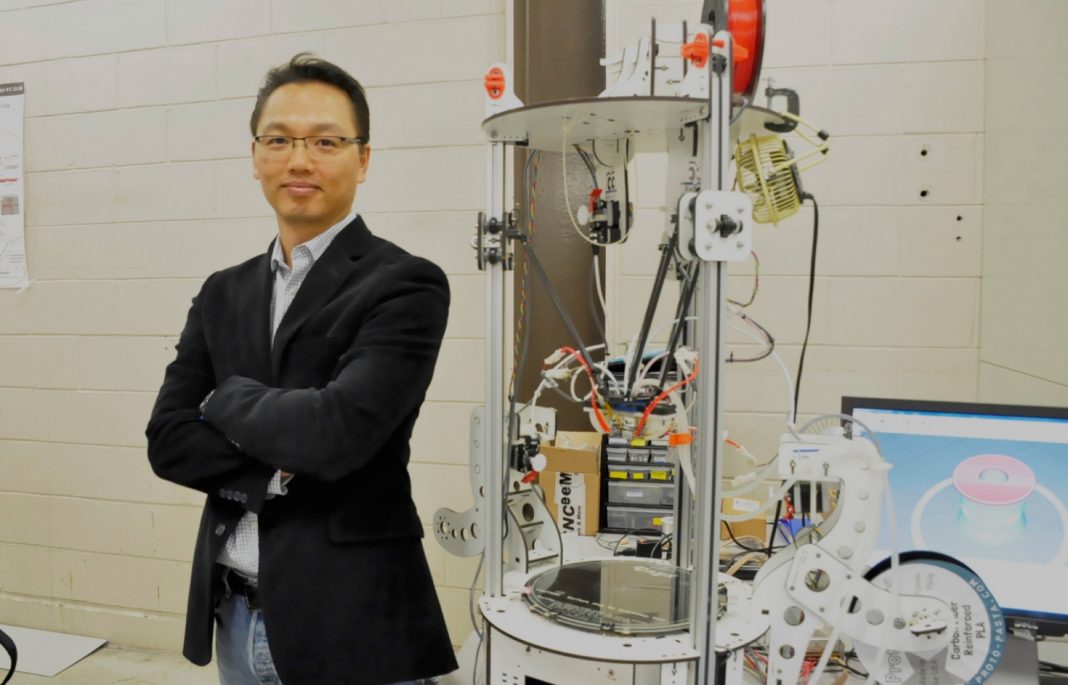In February 2019, SFU researchers collaborated with scientists from the Swiss Federal Laboratories for Materials Science to 3D print wireless Internet-of-Things (IoT) sensors.
The new prototype, named “3D sustainable sensors,” is built from wood-derived cellulose materials, instead of the petroleum-based plastics that are common in most electrical devices.
IoT systems utilize web-powered technologies that “collect, send and act on data they acquire from their surrounding environments using embedded sensors, processors and communication hardware,” according to an article written by Design and Development Today.
Dr. Woo Soo Kim, a mechatronic systems engineering professor at SFU and a Brain Pool Fellow selected by the National Research Foundation of South Korea, along with his Swiss collaborators, were able to transform the numerous sensors that IoT systems rely on to receive digital data and to “connect machines and equipment to the internet,” into biodegradable products.
“Building those systems with naturally derived materials [. . .] could allow manufacturers to dispose of old sensors without contaminating the environment,” according to an article written by Design and Development Today.
Kim stated in an email interview with The Peak that the new product is environmentally-friendly and it can be safely disposed of in any compost bin once it has reached its lifespan. The 3D sustainable sensors can last for several months, but if they are tested with chemicals, then their lifespan decreases, he added.
“Chemicals can damage sensors’ surface after several use. If those sensors are in use for several times [with chemicals], then those [cannot last] for a long time . . . [This is the] objective of disposable sensors,” said Kim.
Kim’s research lab is currently based at SFU Surrey and Surrey’s PowerTech Labs, and his team has been working on the 3D sustainable sensors for about five years. In addition, Kim’s work focuses exclusively on 3D printed electronics and sensors.
When asked what an IoT was in greater detail, Kim said that it is a conceptual approach of collecting and integrating environmental information from various sensors to a wireless “cloud” network.
“[The information that is sent to the cloud] can be mechanical sensing data, chemical sensing data, or environmental sensing such as weather, air pollution, etc,” said Kim.
“You can think that we require lots of different sensors for IoT. What if all the sensors are the eventual hazardous electronic waste later because we cannot [reuse] those sensors? That is why we need to generate bio-compatible and eco-friendly sensors for IoT applications,” he further added.
In terms of pricing for the new product, Kim said that: “Fabrication cost in the University and in the company [cannot] be compared. If we can do mass production, one sensor can cost way less than 50 cents.”
Kim also mentioned that this project was initiated by his lab as they searched for alternative materials of plastics in 3D printed electronics.
“. . . Lots of petroleum based plastics are currently utilized for 3D printing. If we want to reduce electronics’ waste coming from plastics such as green board in printed circuit board, we should reduce plastics. Only way is to replace plastic materials with reliable wood-derived natural fiber-based materials,” stated Kim.
Kim also shared in the email interview that he intends on expanding the eco-friendly sustainable electronics concept to other electronics fields.
“We may replace all the petroleum-based plastics in electronics with eco-friendly wood-derived cellulose materials. [A] new project has been launched with 3D printed cellulose circuit board with local industry partners,” stated Kim.
Kim concluded the interview by sharing that at the moment, his lab is currently working on a few unique 3D printing projects. One of those includes building 3D-printed cellular structures for robotic finger and robot gripper applications.
With files from Design and Development Today




